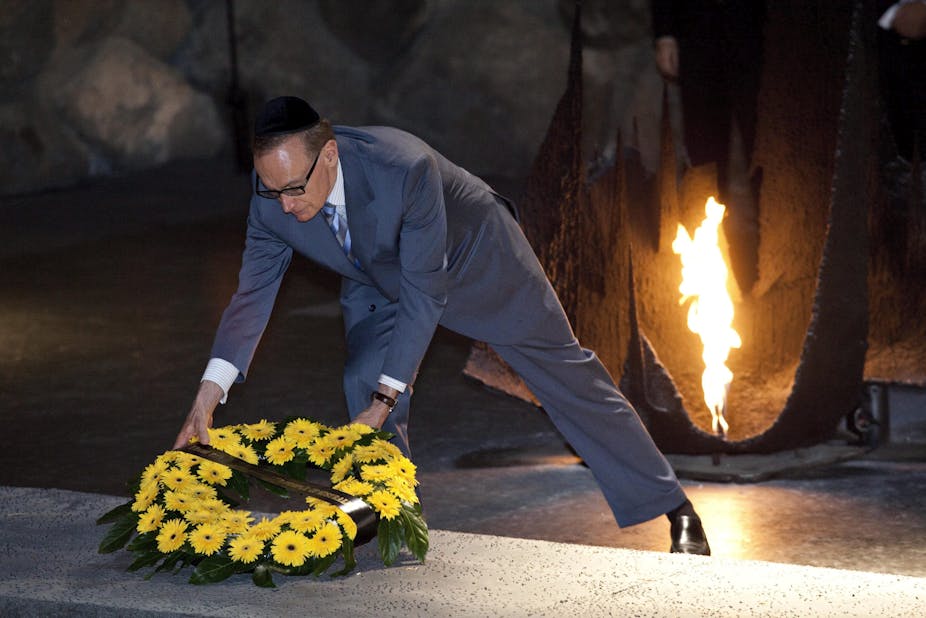Former foreign minister Bob Carr’s stunning claims about the pro-Israel lobby influence raise timely questions about its advocacy in Australian politics. What is the lobby Carr refers to? And how significant is its political influence?
“Pro-Israel lobby” is a term often applied to the loose coalition of organisations and prominent individuals in the United States who lobby Washington on behalf of the state of Israel. Its detractors argue the lobby demonises Palestinians, ensures there is no criticism of Israel within Congress and pressures the executive to support Israel unconditionally. Its defenders argue these claims are exaggerated and often motivated by anti-Semitism.
Yet even prominent American Zionists admit Israel advocacy groups, including the American Israel Public Affairs Committee (AIPAC), have some bearing on US policymaking.
Greater attention has been drawn in recent years to the existence of an Australian pro-Israel lobby. Critics, including blogger Antony Loewenstein, argue this local lobby also stifles debate on the Israeli-Palestinian conflict. On Tuesday, Carr added his concerns, stating that the lobby “inappropriately” and “bullyingly” influenced the Gillard government.
Diaspora advocacy in Australia
Numerous diaspora advocacy groups operate at a federal level in Australia. These represent a cross-section of multicultural Australia, ranging from the Australia Tamil Congress to the Armenian National Committee of Australia. Whether overtly or not, all of these organisations seek to influence Australian government foreign policy on matters relating to their diaspora homeland.
Australian Jewry, with its longstanding connection to the state of Israel, also wants support for Israel. It is no different to other diaspora groups in this respect.
The powerful Israel lobbyists who operate in Washington do not compare in size nor scale with the handful of organisations advocating for Israel in Canberra. Pro-Israel lobbying is the domain of three different organisations: the Zionist Federation of Australia (ZFA), the Executive Council of Australian Jewry (ECAJ) and the Australian Israel and Jewish Affairs Council (AIJAC).
AIJAC is a privately funded thinktank led by executive director Colin Rubenstein and chairman Mark Leibler. The ZFA and ECAJ are two peak communal bodies that make representations to federal parliamentarians about Israel (and other issues relating to Jewish communities across Australia).
Political insiders barely recognise and mostly ignore the ZFA and ECAJ. AIJAC is regarded as the most active voice representing Israel’s interests in Canberra.
AIJAC lobbies for Israel in different but effective ways. It holds public events and private meetings with federal parliamentarians and publishes a monthly magazine, Australia/Israel Review. It keeps a close eye on all news coverage involving Israel while providing frequent commentary to media outlets on Israeli and Middle Eastern-related stories.
Since 2002, AIJAC has hosted more than 500 Australian journalists, politicians and senior public servants on guided tours of Israel. Some politicians privately deride the tours as propaganda exercises. Yet they are a powerful advocacy tool used by the organisation to build political support and sympathy for Israel.
Reaction to Carr’s claims
The response from Israel advocates to Carr’s comments this week was swift and predictably hostile.
On Thursday pro-Israel federal Labor MP Michael Danby poured cold water over Carr’s claims, saying:
No lobby in Australia, I understand, has that kind of influence. It’s laughable.
Similarly, Mark Leibler defended AIJAC on ABC TV’s Lateline, asking:
How does the Jewish lobby control the prime minister? Through donations to the ALP and sending people to Israel. I mean, give me a break. Would anyone seriously accept that?
Carr’s comments and the reactions inevitably raise the question: how much influence does the pro-Israel lobby (particularly AIJAC) wield in Australian politics?
They are organised, well-resourced and one of the most effective examples of diaspora advocacy in Australia. And, increasingly, one of the more prominent too.
Beyond that, it is difficult to measure. The little academic research conducted in this area has been inconclusive.
Certainly the pro-Israel lobbyists are not as powerful as critics, including Carr, suggest. Nor are they as as insignificant as Leibler and Danby would have us believe.
Demographic impacts on lobbying
The changing nature of Australia’s demographics, including the growth of Arab communities in the federal electorates of western Sydney, presents a future dilemma for both the Labor and Liberal parties. Any influence the pro-Israel lobby currently wields will be tempered by the political objective to appease Australian Muslims, many of whom could demand a more even-handed approach to Israel and Palestine.
AIJAC will continue to drive the policy agenda towards Israel. It will always seek to foster closer ties between parliamentarians in Canberra and the Jewish state, including its successful tour program.

